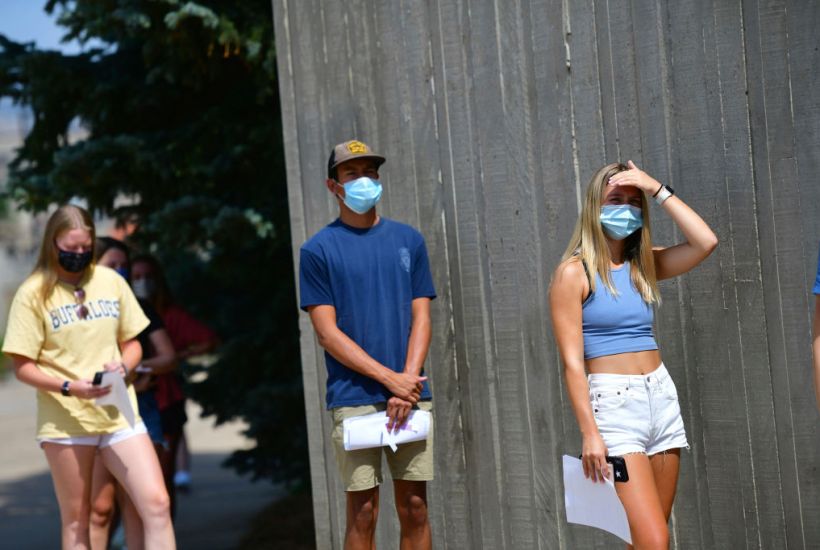Usually I can’t wait for the start of a new term at university. But not this year. When students return, the rules are clear: no fun, no sex, lots of screen time – and the same high fees.
A number of universities – including Cambridge – have said all lectures will be online-only until next summer. As for Oxford, where I study physics, masks will be compulsory in tutorials and students will be stuck for the most part in small ‘households’ within their colleges. In some ways, we can count ourselves lucky: other university students will have no in-person contact hours at all. But either way, is this really worth over £9,000 a year?
For those already on courses and going into their second or third years, the options are limited. Drop out and miss out on a degree. Or put up and shut up. Universities know that many have little choice but to opt for the latter. And the result is that the 2020/21 academic year will be a miserable one for students.
In many cases, the rules imposed by universities appear to be stricter even than government guidance. Universities have vowed to discipline students who break the rules. Bristol university will dish out £800 fines to those who don’t follow the guidelines, and Oxford has warned of the possibility of a return to full lockdown if students flout the rules. Students will not be allowed to visit each other’s rooms or have friends over for dinner. But is this the right approach when even the government’s own cautious guidance now allows indoor mixing?
What seems all too clear is that when it comes to paying our fees, students are treated like adults. But we are treated like children when it comes to making decisions about our private lives. Is it really the place of a university to tell students they can’t have one-night stands because of the risk of catching coronavirus?
Universities taking such an overzealous stance seem to be the rule rather than the exception. The University of East Anglia has banned overnight guests and other universities are planning to spend tens of thousands on security staff to ensure students are abiding by social distancing regulations. Some universities may go as far as asking students to report others not following the rules. The plans mean students face a dilemma: obey the rules and face isolation and loneliness, or risk being fined for stepping out of line.
Thousands of 18-year-olds took to the streets and social media to protest the Ofqual algorithm-awarded A levels, and managed to overturn the result in favour of predicted grades. This was a huge victory for school students and should reassure young people that their united voices are loud and effective. Students should learn from this example – and demand more from their universities.
Unfortunately that seems unlikely to happen. It is surprising that students have, for the most part, appeared to accept these often arbitrary rules, which in many cases don’t appear to be about ‘following the science’. Any criticism of the universities’ draconian measures provokes social media outrage of ‘you’re killing granny’, with no critical thought applied. But isn’t being at university all about challenging views and starting debate? Why should our response to coronavirus be exempt from free-thinking?
Young people should be leading the charge back to normal life, as those least at risk and with the most to lose. Schools are going back next week; higher education should not be any less important. We should be looking at the statistics, shouting at those in charge of our universities to make us a better offer and deliver the real university experience we have spent years looking forward to – and which we are paying for.
Daily Covid deaths have been in single figures for several weeks and there has been a consistent decrease in hospitalisations. Data published by the Centre for Evidence Based Medicine in Oxford appears to indicate that the virus is becoming less aggressive and the case-fatality ratio is in decline. Deaths in the UK have been below average for the past seven weeks now, and the overwhelming majority of Covid deaths have been in older people, often with serious debilitating pre-existing conditions, few of whom live or work at a university. University staff who are concerned about the risks should, of course, be allowed to protect themselves. No one is saying otherwise. But for the most part, students should be encouraged to return to normal, not this ‘new normal’ where the only thing familiar is the fees.
Universities may be returning this autumn but the fun has been sucked out of learning and living. Instead of freshers week joy, the prospect for the class of 2020/21 is rather more glum: being fined for failing to maintain social distance and endless Zoom lectures. Students, this is a call to action: let’s get our lives back.
Got something to add? Join the discussion and comment below.
Get 10 issues for just $10
Subscribe to The Spectator Australia today for the next 10 magazine issues, plus full online access, for just $10.
Lois Heslop is studying physics at Oxford




















Comments
Don't miss out
Join the conversation with other Spectator Australia readers. Subscribe to leave a comment.
SUBSCRIBEAlready a subscriber? Log in